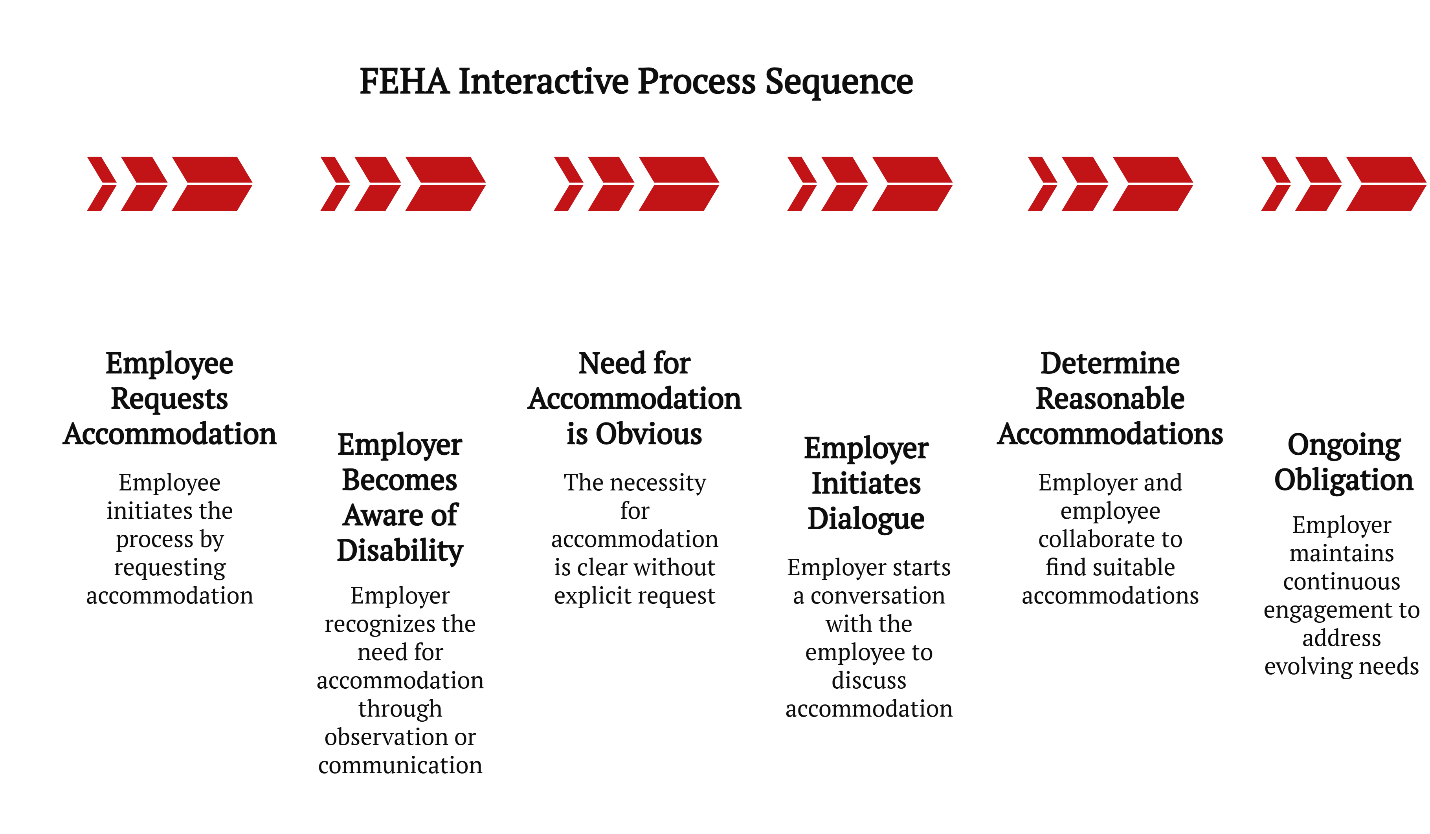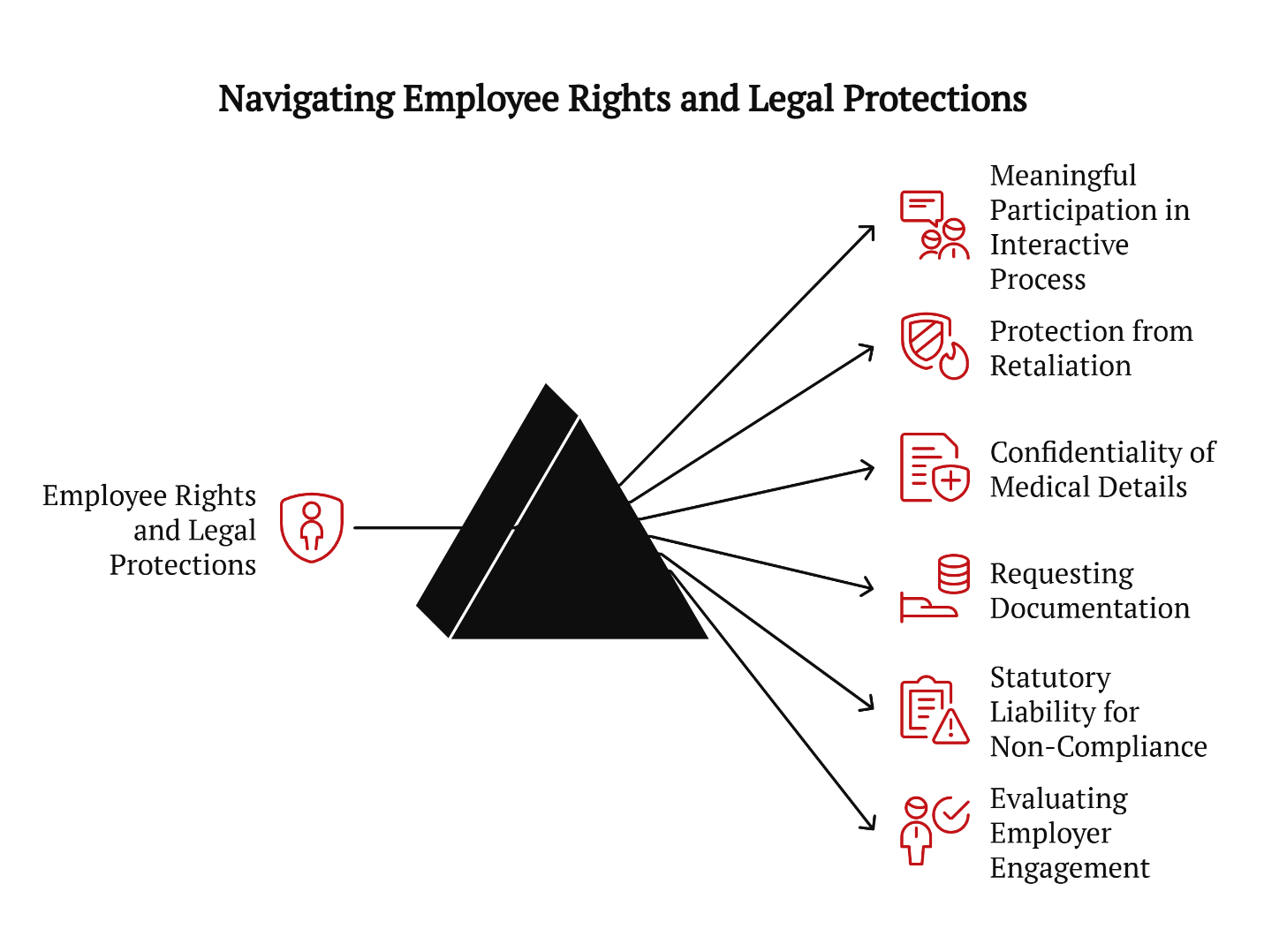📌 Key Takeaways
Failure to Engage in the Interactive Process May Trigger Statutory Liability
Under California Government Code § 12940(n), employers have a legal obligation to initiate a timely, good faith interactive process when a disability—such as diabetes—is known or accommodation is requested. Noncompliance may lead to legally actionable FEHA violations.
Interactive Process Must Be Ongoing and Individualized
Employers are required to conduct a personalized and evolving dialogue with the employee. A one-time conversation may not fulfill this statutory duty, particularly if no undue hardship evaluation is documented.
Employees with Diabetes Hold Specific Legal Rights Under FEHA
California law grants employees the right to participate meaningfully in the accommodation process, to request confidentiality for medical information, and to be protected from retaliation for asserting these rights.
Legal Consultation Is Strongly Recommended for Potential Violations
Employees experiencing delayed responses, superficial engagement, or termination after accommodation requests should consult a California employment attorney promptly due to strict statutory time limits.
By understanding these legal obligations and protections, readers can better assess when employer conduct may cross the line into a statutory violation—and why early legal consultation is essential.
California’s Fair Employment and Housing Act (FEHA) establishes a statutory requirement that employers must engage in a timely, good faith interactive process with employees who have a known disability—such as diabetes—when accommodation may be necessary. This process is not optional; under California Government Code § 12940(n), it is a legal duty imposed on covered employers.
While many individuals manage diabetes independently, employment conditions may arise that require reasonable accommodations. In these situations, the interactive process becomes legally significant.
Statutory Framework: What the Law Requires

The interactive process under FEHA is a mandatory, individualized dialogue between an employer and an employee with a disability. The goal is to determine effective reasonable accommodations that would allow the employee to perform essential job functions without imposing an undue hardship on the employer.
The obligation to initiate this process arises when:
- An employee requests an accommodation;
- The employer becomes aware of a disability through observation or communication;
- The need for accommodation is otherwise reasonably obvious.
Unlike the federal Americans with Disabilities Act (ADA), FEHA imposes more rigorous standards, requiring proactive engagement from employers under California law. The interactive process is not a single conversation but an ongoing obligation, especially if an employee’s medical needs evolve.
Laws governing employer obligations in this area may be updated; employees and employers should consult official sources or qualified counsel to confirm current requirements.
Employer Obligations During the Interactive Process
Under California law, employers must do more than acknowledge a request. They are required to engage in the process with good faith and timeliness. Statutory duties include:
- Assessing essential job functions and evaluating how the disability impacts them;
- Identifying and considering reasonable accommodations, such as modified schedules, remote work (if feasible), or adjustments to break times;
- Ensuring confidentiality of medical information shared during the process;
- Documenting all communications and decisions related to accommodation discussions;
- Continuing the dialogue as circumstances change or when initial accommodations are ineffective.
Timeliness is a core element of legal compliance. A delayed or superficial effort may constitute a failure to comply with § 12940(n), particularly when no valid undue hardship is documented.
Illustrative example (not legal advice):
An employee with diabetes informs their supervisor they need to take regular breaks to check blood glucose levels, and that they would like to meet to discuss a modified work schedule. The employer acknowledges the request but does not schedule a follow-up meeting or offer interim accommodation for over three months. This may violate the employer’s obligation to engage in a good faith interactive process.
This scenario is hypothetical and provided for illustrative purposes only. Legal conclusions depend on specific facts and should be assessed by an attorney.
Employee Rights and Legal Protections

Employees with diabetes have the statutory right to meaningful participation in the interactive process under FEHA. This includes:
- Having their accommodation requests addressed through an individualized dialogue;
- Being protected from retaliation for disclosing a disability or seeking accommodations;
- Receiving assurances that confidential medical details will be safeguarded;
- Requesting documentation related to the process.
A failure to initiate, continue, or genuinely participate in the interactive process may result in statutory liability under California law—particularly when adverse employment actions follow the employee’s accommodation request.
However, each situation must be evaluated based on specific facts. Not all employer denials constitute violations. The quality, timing, and sincerity of employer engagement are critical components in determining statutory compliance.
Why This Matters for Employees Managing Diabetes
The interactive process is not simply an HR formality—it is a legally required obligation. For employees with diabetes, accommodation such as scheduled breaks, access to food or medical devices, or adjusted shifts may make a significant difference in managing their health while fulfilling job responsibilities.
When an employer refuses to engage in the interactive process, responds only superficially, or terminates an employee shortly after a disclosure or request, those actions may signal a potential violation of FEHA. While legal conclusions require detailed evaluation, understanding these obligations provides a valuable perspective for recognizing when statutory rights may be at risk.
Employees who encounter these issues should consult a California employment attorney as soon as possible. This is particularly important due to statutory limitations under FEHA, which restrict the time available to pursue claims.
Frequently Asked Questions
What does California law require during the interactive process for diabetes-related accommodations?
Under Government Code § 12940(n), employers must engage in a timely, good faith dialogue with the employee to determine whether effective, reasonable accommodations can be made.
When must an employer initiate the interactive process under California law?
The obligation begins when the employer knows—or should reasonably know—of the employee’s disability and potential need for accommodation. Delays or non-responsiveness may indicate noncompliance with statutory obligations.
When should someone consult an attorney about interactive process issues?
If an employer fails to respond, retaliates, or terminates an employee shortly after a request for accommodation, a qualified employment attorney should be consulted. FEHA claims are time-sensitive, and legal advice depends on the specific facts of the case.
Frequently Unasked Questions
Are there limits to what an employer can ask about a medical condition like diabetes?
Yes. California law restricts medical inquiries to those strictly necessary for understanding the employee’s functional limitations. Employers cannot require broad disclosure of private medical information or demand diagnostic details beyond what is relevant to workplace accommodation.
What if the interactive process doesn’t lead to an accommodation?
Even if an accommodation isn’t provided, the employer is still required to show that it engaged in the process in good faith. The duty to explore alternatives continues unless accommodations would create documented undue hardship.
Disclaimer:
This content is for informational purposes only. This content is not legal advice. No attorney-client relationship is formed through this content. Please consult a qualified attorney in your jurisdiction for legal advice specific to your situation.
Protect Your Rights | The Akopyan Law Firm, A.P.C. | Top Gun Employment Lawyers
Have you been wrongfully terminated from your job? Have you suffered discrimination, harassment, or retaliation in the workplace? Has your employer violated wage and hour laws? If so, we can help. The Akopyan Law Firm, A.P.C. is dedicated to protecting and enforcing employees’ rights throughout Southern California. With a 97% success rate and millions recovered for our clients, our team of experienced and talented employment lawyers can fight to secure the justice you deserve.
Take the First Step Towards Securing Justice: Call us today to speak with one of our experienced employment lawyers. The firm offers case evaluations free of charge.
Contact Us Today:
- Phone: (818) 509-9975
- Office Locations: Los Angeles, Bakersfield, Costa Mesa, Temecula, Rancho Cucamonga, Oxnard, Culver City, and San Diego in California.
Important: Contacting the Akopyan Law Firm, A.P.C. does not create an attorney-client relationship, but all communications will remain private and confidential. Each case is unique. The Akopyan Law Firm, A.P.C., does not guarantee any outcome.

